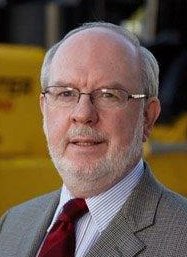 Michael P Brogan |
Michael P Brogan believes the forklift industry has improved product reliability, continues to evolve technologically and provides a potentially stable future for young workers.
Brogan, 64, retires on 31 August as vice chairman and chief executive officer of Nacco Materials Handling Group (NMHG), concluding 31 years in the industry. Colin Wilson will succeed Brogan as CEO, effective from 1 September, and continue as NMHG president.
Among the changes he's seen, Brogan cites reliability gains: "Products today have a higher degree of reliability if maintained properly. Users can depend on them (to perform)."
Historically, electronic controllers were a big problem. "Now, they are very good and highly reliable," he notes. "Better onboard diagnostics are available (and, for big users,) the degree of dependency on product is enhanced by reliability".
Regarding forklift technology, Brogan envisions the use of lithium ion as a source of motive power in the future, although it is not yet cost effective. He expects that the cost of lithium ion technology should come down as large-scale users, such as the automotive industry, invest further in development.
Brogan observes that fuel cells "have been around since the 1800s (and represent) an attractive power source for the future". He believes, however, that more time is needed to prove the durability and reliability of fuel cells and identify which materials handling niches can benefit most from the application.
"We have supplied fuel cells to big operations for a number of years," he says, adding that an equipment manufacturer "must be selective and have the partner who wants to go there. The technology will evolve".
Regarding employment, "a lot of people who go into the industry stay with it through their entire career", he says. "It is not a glamorous industry, but it is always there through economic ups and downs because material has to be moved."
Turning to global developments, when the iron curtain came down in eastern Europe in 1989, the materials handling equipment "business exploded in all of those countries", Brogan notes. "People had choices of multiple products. Consumerisation and globalisation stimulated the movement of goods. When you have hundreds of SKUs, you must move them quickly."
Brogan recognises how dynamic changes in emerging economics have changed Asia, including China. He believes Africa will be "a huge market" in about a decade and that "Latin America is ahead of Africa" in its demands for materials handling equipment.
Across the board, product developers at equipment manufacturers need to continue to design systems to meet increasing demands for moving goods "more efficiently, more effectively and in a friendly ecological way", he says.
During his retirement, Brogan plans to spend more time with his family, including two grandchildren, in Washington, DC. He will pursue hobbies such as horseback riding and golf and possibly extend his interests in reading and history to include visits to some of his favourite places, including Peru, Argentina, Turkey and Greece.
Brogan is based in Fairview at NMHG's administrative and R&D centre.
He joined Hyster Co in 1983 as a design manager in Dublin, Ireland, where Hyster had opened a factory to produce automated guided vehicles. The Hyster effort began in 1982 and was reluctantly closed in 1987. "That did not work out," Brogan notes. "Hyster was ahead of its time in that business."
Brogan transferred to Hyster's Europe business as director of parts operations and then director of engineering. He managed a NMHG subsidiary in Italy and, in 1999, became a NMHG Holding Co executive with increasing levels of responsibility for warehouse product strategy, development and procurement and international operations.
Nacco Industries Inc acquired North Carolina-based Yale Materials Handling Corp in 1985 and Oregon-based Hyster in 1989. Yale was merged into Hyster on 1 January 1994, and Hyster changed its name to NMHG Inc.
NMHG is a wholly-owned operating subsidiary of Hyster-Yale Materials Handling Inc of Mayfield Heights, Ohio. Nacco Industries spun off Hyster-Yale into a separate, publicly traded company in September 2012.